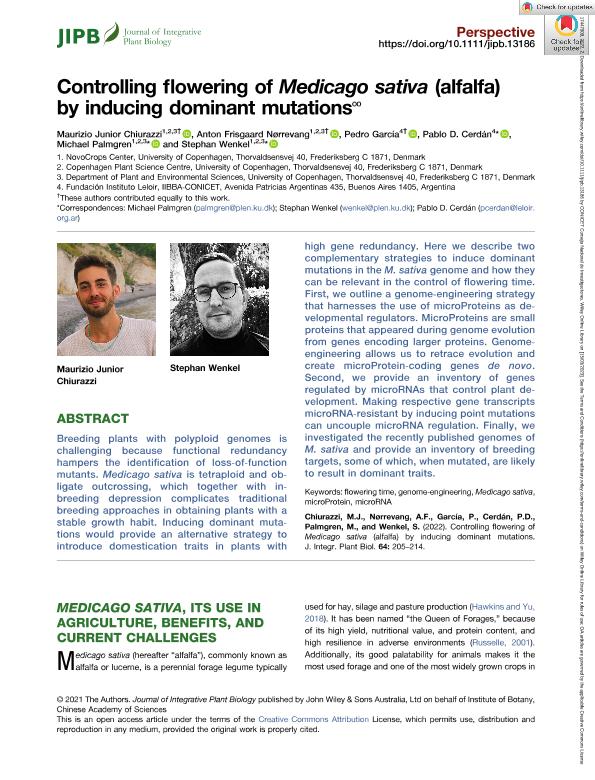Artículo
Controlling flowering of Medicago sativa (alfalfa) by inducing dominant mutations
Chiurazzi, Maurizio Junior; Nørrevang, Anton Frisgaard; García, Pedro; Cerdan, Pablo Diego ; Palmgren, Michael; Wenkel, Stephan
; Palmgren, Michael; Wenkel, Stephan
 ; Palmgren, Michael; Wenkel, Stephan
; Palmgren, Michael; Wenkel, Stephan
Fecha de publicación:
02/2022
Editorial:
Wiley Blackwell Publishing, Inc
Revista:
Journal Of Integrative Plant Biology
ISSN:
1672-9072
Idioma:
Inglés
Tipo de recurso:
Artículo publicado
Clasificación temática:
Resumen
Breeding plants with polyploid genomes is challenging because functional redundancy hampers the identification of loss-of-function mutants. Medicago sativa is tetraploid and obligate outcrossing, which together with inbreeding depression complicates traditional breeding approaches in obtaining plants with a stable growth habit. Inducing dominant mutations would provide an alternative strategy to introduce domestication traits in plants with high gene redundancy. Here we describe two complementary strategies to induce dominant mutations in the M. sativa genome and how they can be relevant in the control of flowering time. First, we outline a genome-engineering strategy that harnesses the use of microProteins as developmental regulators. MicroProteins are small proteins that appeared during genome evolution from genes encoding larger proteins. Genome-engineering allows us to retrace evolution and create microProtein-coding genes de novo. Second, we provide an inventory of genes regulated by microRNAs that control plant development. Making respective gene transcripts microRNA-resistant by inducing point mutations can uncouple microRNA regulation. Finally, we investigated the recently published genomes of M. sativa and provide an inventory of breeding targets, some of which, when mutated, are likely to result in dominant traits.
Palabras clave:
FLOWERING TIME
,
GENOME-ENGINEERING
,
MEDICAGO SATIVA
,
MICROPROTEIN
,
MICRORNA
Archivos asociados
Licencia
Identificadores
Colecciones
Articulos(IIBBA)
Articulos de INST.DE INVEST.BIOQUIMICAS DE BS.AS(I)
Articulos de INST.DE INVEST.BIOQUIMICAS DE BS.AS(I)
Citación
Chiurazzi, Maurizio Junior; Nørrevang, Anton Frisgaard; García, Pedro; Cerdan, Pablo Diego; Palmgren, Michael; et al.; Controlling flowering of Medicago sativa (alfalfa) by inducing dominant mutations; Wiley Blackwell Publishing, Inc; Journal Of Integrative Plant Biology; 64; 2; 2-2022; 205-214
Compartir
Altmétricas



